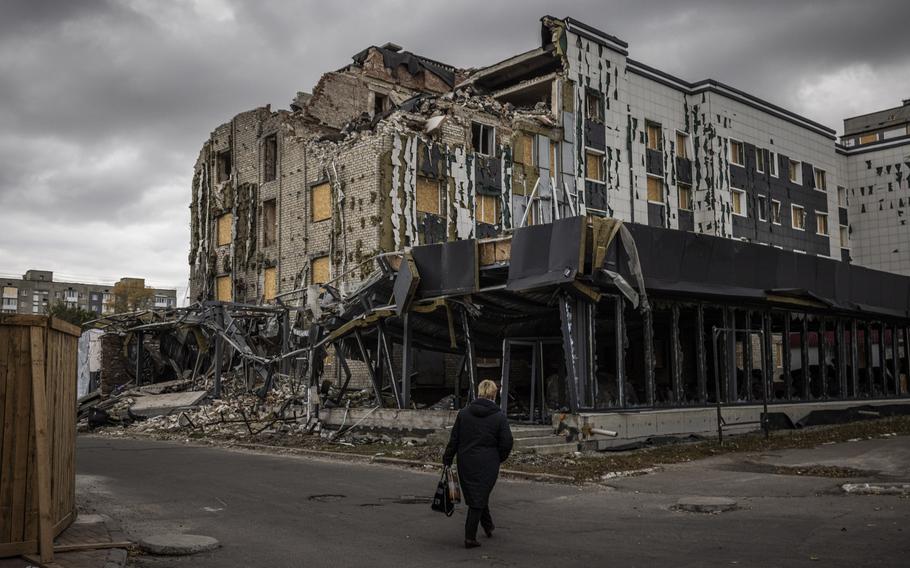Europe
Russia is targeting Ukrainian hotels to discourage journalists, report says
The Washington Post May 16, 2025

The remains of the Druzhba Hotel in Pokrovsk, in eastern Ukraine, which was hit by a Russian missile strike in 2023. (Ed Ram/The Washington Post)
KYIV — Russia has struck 25 hotels near Ukraine’s front lines from the beginning of the war in 2022 through March in what appears to be a campaign to discourage journalism in the area, according to a report by the media rights group Reporters Without Borders and a Ukrainian organization, Truth Hounds.
The attacks on hotels were initially sporadic but have escalated over the past year, indicating a “shift from isolated events to a sustained threat” for media personnel working on the front lines, the report states. It found that 24 journalists had been injured and one killed in hotel strikes since the war began.
“These attacks are part of a larger strategy to sow terror and seek to reduce coverage of the war,” said Pauline Maufrais, regional officer for Ukraine at Reporters Without Borders, which goes by its French acronym, RSF. “The targeted buildings are not ‘Ukrainian military bases,’ and the journalists inside are not ‘mercenaries,’ contrary to the disinformation narrative relentlessly pushed by all levels of the Russian state and pro-Kremlin outlets.”
Russia’s use of precision munitions such as ballistic and cruise missiles in the attacks showed that the hotels were targeted and the attacks were “part of a broader strategy aimed at discouraging independent reporting from the front line,” the report said.
Russia has often said hotels are legitimate targets because Ukrainian military guests or foreign mercenaries stay there, but the report found no correlation between the targeted hotels and a military presence. Rather, the investigation found that the common thread in the attacks was that the hotels were known for housing journalists.
Tourism ceased in front-line areas, and staying the night is off limits for most international workers from nongovernmental organizations, leaving journalists the main customers for the remaining hotels.
The Russian Defense Ministry did not respond to a request for comment about the report.
A survey by the two organizations found that 64 percent of journalists considered that Russia’s increased strikes on hotels had complicated their ability to work in the war zone.
In some cases, military personnel on leave were staying at the hotels, but only one targeted hotel had hosted members of the armed forces on military business, according to the report.
Violetta Pedorych, a producer for French TV and other Western outlets, survived when the Park Hotel in Kharkiv was hit by two Russian missiles on Jan. 10, 2024, although she sustained injuries.
Pedorych told The Washington Post that she and her team had always stayed at the hotel because they considered it safe. The Park is a small hotel outside the city center, and they had never seen members of the military stay there, she said.
Pedorych said she still travels to front-line areas but now stays in rented apartments instead of hotels.
“Many journalists now avoid hotels near the front, some suspend fieldwork, and most face logistical challenges. This hampers reporting,” Maufrais said.
Poor road quality in the front-line areas and the large distances between battlefield hot spots previously meant journalists tried to stay in the nearest, safest town in the front-line region.
But because there now are few hotels operating, journalists either stay in apartments in front-line towns or make eight-to-10-hour trips from places such as Dnipro, the southern Ukrainian city that lies between the front-line regions of Donetsk and Zaporizhzhia.
The report found that 13 percent of media organizations had stopped or reduced front-line travel in light of the hotel attacks, deeming it too dangerous and logistically complicated.
Another issue, said Oksana Romaniuk, head of Ukraine’s Institute of Mass Information, a media rights group, is that security decisions are often made by managers abroad whose experience is drawn from conflicts in other regions, such as the Middle East, and who don’t realize the safety problems with hotels in Ukraine.
Romaniuk cited the example of the attack on a team staying in hotel in Kramatorsk in August, which left two members injured and killed their security adviser.
She said that the group had not wanted to stay there because there had been attacks on hotels in the area in the preceding months, but the media outlet’s security protocol insisted the team be housed in a hotel.
“Let field teams make the final decision what is best for them,” Romaniuk said.